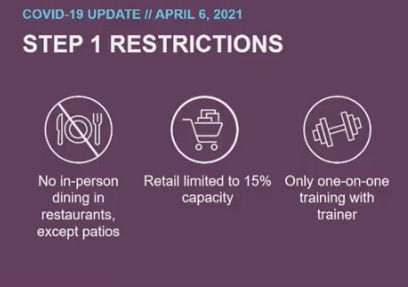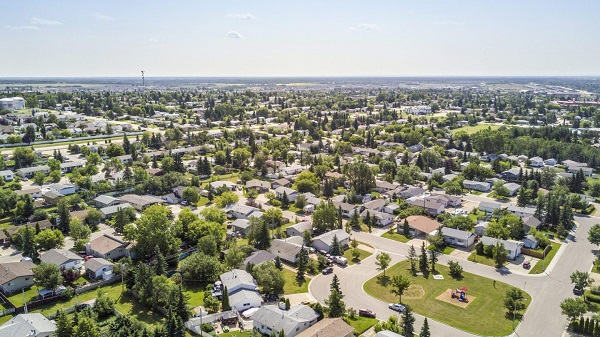Alberta
Alberta goes back to Step 1 Lockdown Restrictions

From the Province of Alberta
Alberta is returning to Step 1 of the four-step framework to protect the health system and reduce the rising spread of COVID-19 provincewide.
Effective at 11:59 p.m. on April 6, updated mandatory health measures go into effect for retail, fitness and performance activities. Effective at noon on Friday, April 9, restaurants will be restricted to providing only takeout, delivery and patio service.
Alberta will remain in Step 1 with restaurant restrictions until further notice. Health officials will continue to closely monitor the spread of COVID-19 to assess whether additional action is needed to reduce transmission.
“We are taking strong action to stop the third wave from threatening our health system and the health of thousands of Albertans. The rapid rise in cases, especially variants of concern, makes this a critical time to stop the spread. These measures will buy us some time for additional COVID-19 vaccines to arrive and take effect so we can once again start safely easing restrictions as quickly as possible.”
“The rising spread of variants means that we must take stricter measures in order to protect capacity in our health system and save lives. These mandatory new health measures will only be needed for a short while as we vaccinate Albertans as quickly as possible.”
“I am extremely concerned by the recent increase in COVID-19 cases in Alberta. All Albertans must take these additional measures very seriously; this virus is highly contagious. Only by working together can we protect each other, reduce the spread and protect our health system.”
Step 1 restrictions
The following mandatory public health measures come into effect at 11:59 p.m. on April 6:
Retail
- Retail services must reduce customer capacity to 15 per cent of fire code occupancy, with a minimum of five customers permitted.
- Curbside pickup, delivery and online services are encouraged.
- Shopping malls will be limited to 15 per cent of fire code occupancy.
Indoor fitness
- Only one-on-one training with an individual or household is permitted for indoor fitness activities (e.g., fitness in dance studios, training figure skating on ice, one-on-one lessons).
- No drop-in activities or unsupervised individual fitness.
- Group fitness, high or low intensity, is not allowed.
- Outdoor physical activity is allowed with up to 10 people, provided physical distancing is maintained between households.
Adult performance activities
- Adult performance activities are not permitted. Performance activities include dancing, singing, acting, playing a musical instrument and any rehearsal or theatrical performances.
The following mandatory public health measures come into effect at noon on Friday, April 9:
Restaurants, pubs, bars, lounges and cafés
- Indoor in-person service is no longer permitted
- Takeout, curbside pickup and delivery services are permitted.
- Outdoor patio dining is also allowed. Tables and dining parties must be two metres apart or separated by an impermeable barrier that will prevent droplet transmission.
- Household members only, or two close contacts of someone who lives alone.
- Contact information must be collected from one person of the dining party.
The following mandatory public health measures remain in effect unchanged:
Places of worship
- All places of worship will continue to be limited to 15 per cent of fire code occupancy for in-person attendance.
- Virtual or online services are strongly encouraged.
- Drive-in services where individuals do not leave their vehicles and adhere to guidance will be permissible and are not subject to capacity restrictions.
Social gatherings
- Indoor social gatherings continue to be prohibited.
- Outdoor social gatherings are limited to 10 participants, provided physical distancing and other measures continue to be followed.
Personal and wellness services
- Personal and wellness services can be open for appointment only. This includes hair salons, nail salons, massage, tattoos and piercing.
- Health services, including physiotherapy or acupuncture, social or protective services, shelters for vulnerable persons, emergency services, child care, and not-for-profit community kitchens or charitable kitchens can remain open for in-person attendance.
Indoor and outdoor children’s sport and performance
- K-12 schools and post-secondary children’s sport and performance activities, such as physical education classes, can now use off-site facilities to support curriculum-related educational activities.
- Lessons, practices and conditioning activities, but not games, may occur for indoor team-based minor sports/activities and school athletics.
- All participants must be 18 years old or younger, excluding coaches or trainers.
- Maximum of 10 individuals, including all coaches, trainers and participants.
- Participants must stay physically distanced from each other at all times.
Metrics based on cases and growth, including COVID-19 variants, are being monitored and will also be used to guide any decisions around the need to pause further steps or potentially increase restrictions.
Alberta’s government is responding to the COVID-19 pandemic by protecting lives and livelihoods with precise measures to bend the curve, sustain small businesses and protect Alberta’s health-care system.
Alberta
REPORT: Alberta municipalities hit with $37 million carbon tax tab in 2023

Grande Prairie. Getty Images photo
From the Canadian Energy Centre
Federal cash grab driving costs for local governments, driving up property taxes
New data shows the painful economic impact of the federal carbon tax on municipalities.
Municipalities in Alberta paid out more than $37 million in federal carbon taxes in 2023, based on a recent survey commissioned by Alberta Municipal Affairs, with data provided to the Canadian Energy Centre.
About $760,000 of that came from the City of Grande Prairie. In a statement, Mayor Jackie Clayton said “if the carbon tax were removed, City property taxes could be reduced by 0.6 per cent, providing direct financial relief to residents and businesses in Grande Prairie.”
Conducted in October, the survey asked municipal districts, towns and cities in Alberta to disclose the amount of carbon tax paid out for the heating and electrifying of municipal assets and fuel for fleet vehicles.
With these funds, Alberta municipalities could have hired 7,789 high school students at $15 per hour last year with the amount paid to Ottawa.
The cost on municipalities includes:
Lloydminster: $422,248
Calgary: $1,230,300 (estimate)
Medicine Hat: $876,237
Lethbridge: $1,398,000 (estimate)
Grande Prairie: $757,562
Crowsnest Pass: $71,100
Red Deer: $1,495,945
Bonnyville: $19,484
Hinton: $66,829
Several municipalities also noted substantial indirect costs from the carbon tax, including higher rates from vendors that serve the municipality – like gravel truck drivers and road repair providers – passing increased fuel prices onto local governments.
The rising price for materials and goods like traffic lights, steel, lumber and cement, due to higher transportation costs are also hitting the bottom line for local governments.
The City of Grande Prairie paid out $89 million in goods and services in 2023, and the indirect costs of the carbon tax “have had an inflationary impact on those expenses” in addition to the direct costs of the tax.
In her press conference announcing Alberta’s challenge to the federal carbon tax on Oct. 29, 2024, Premier Danielle Smith addressed the pressures the carbon tax places on municipal bottom lines.
“In 2023 alone, the City of Calgary could have hired an additional 112 police officers or firefighters for the amount they sent to Ottawa for the carbon tax,” she said.
In a statement issued on Oct. 7, 2024, Ontario Conservative MP Ryan Williams, shadow minister for international trade, said this issue is nationwide.
“In Belleville, Ontario, the impact of the carbon tax is particularly notable. The city faces an extra $410,000 annually in costs – a burden that directly translates to an increase of 0.37 per cent on residents’ property tax bills.”
There is no rebate yet provided on retail carbon pricing for towns, cities and counties.
In October, the council in Belleville passed a motion asking the federal government to return in full all carbon taxes paid by municipalities in Canada.
The unaltered reproduction of this content is free of charge with attribution to the Canadian Energy Centre.
Alberta
MAiD In Alberta: Province surveying Albertans about assisted suicide policies

Alberta’s government is launching a public engagement to gather input about legislation and policies around assisted suicide, also referred to as medical assistance in dying (MAID).
Medical assistance in dying is a process that allows an eligible person to receive assistance from a medical practitioner in ending their life. To be found eligible, a person must be suffering from a serious and permanent medical condition.
Alberta’s government is reviewing how MAID is regulated to ensure there is a consistent process as well as oversight that protects vulnerable Albertans, specifically those living with disabilities or suffering from mental health challenges. An online survey is now open for Albertans to share their views and experiences with MAID until Dec. 20.
“We recognize that medical assistance in dying is a very complex and often personal issue and is an important, sensitive and emotional matter for patients and their families. It is important to ensure this process has the necessary supports to protect the most vulnerable. I encourage Albertans who have experience with and opinions on MAID to take this survey.”
In addition to the online survey, Alberta’s government will also be engaging directly with academics, medical associations, public bodies, religious organizations, regulatory bodies, advocacy groups and others that have an interest in and/or working relationship to the MAID process, health care, disabilities and mental health care.
Feedback gathered through this process will help inform the Alberta government’s planning and policy decision making, including potential legislative changes regarding MAID in Alberta.
“Our government has been clear that we do not support the provision of medically assisted suicide for vulnerable Albertans facing mental illness as their primary purpose for seeking their own death. Instead, our goal is to build a continuum of care where vulnerable Albertans can live in long-term health and fulfilment. We look forward to the feedback of Albertans as we proceed with this important issue.”
“As MAID is a federally legislated and regulated program that touches the lives of many Albertans, our priority is to ensure we have robust safeguards to protect vulnerable individuals. Albertans’ insights will be essential in developing thoughtful policies on this complex issue.”
The federal Criminal Code sets out the MAID eligibility criteria, procedural safeguards and reporting obligations. The federal government has paused MAID eligibility for individuals with a mental illness as their sole underlying medical condition until March 2027 to ensure the provincial health care systems have processes and supports in place. Alberta’s government does not support expanding MAID eligibility to include those facing depression or mental illness and continues to call on the federal government to end this policy altogether.
Related information
-

 Brownstone Institute17 hours ago
Brownstone Institute17 hours agoThe Most Devastating Report So Far
-

 Economy1 day ago
Economy1 day agoCOP 29 leaders demand over a $1 trillion a year in climate reparations from ‘wealthy’ nations. They don’t deserve a nickel.
-

 Censorship Industrial Complex21 hours ago
Censorship Industrial Complex21 hours agoAnother Mass Grave?
-

 ESG4 hours ago
ESG4 hours agoCan’t afford Rent? Groceries for your kids? Trudeau says suck it up and pay the tax!
-

 Alberta20 hours ago
Alberta20 hours agoMAiD In Alberta: Province surveying Albertans about assisted suicide policies
-

 Energy1 day ago
Energy1 day agoOttawa’s proposed emission cap lacks any solid scientific or economic rationale
-

 Alberta1 day ago
Alberta1 day agoOn gender, Alberta is following the science
-

 International5 hours ago
International5 hours agoElon Musk praises families on X: ‘We should teach fear of childlessness,’ not pregnancy


